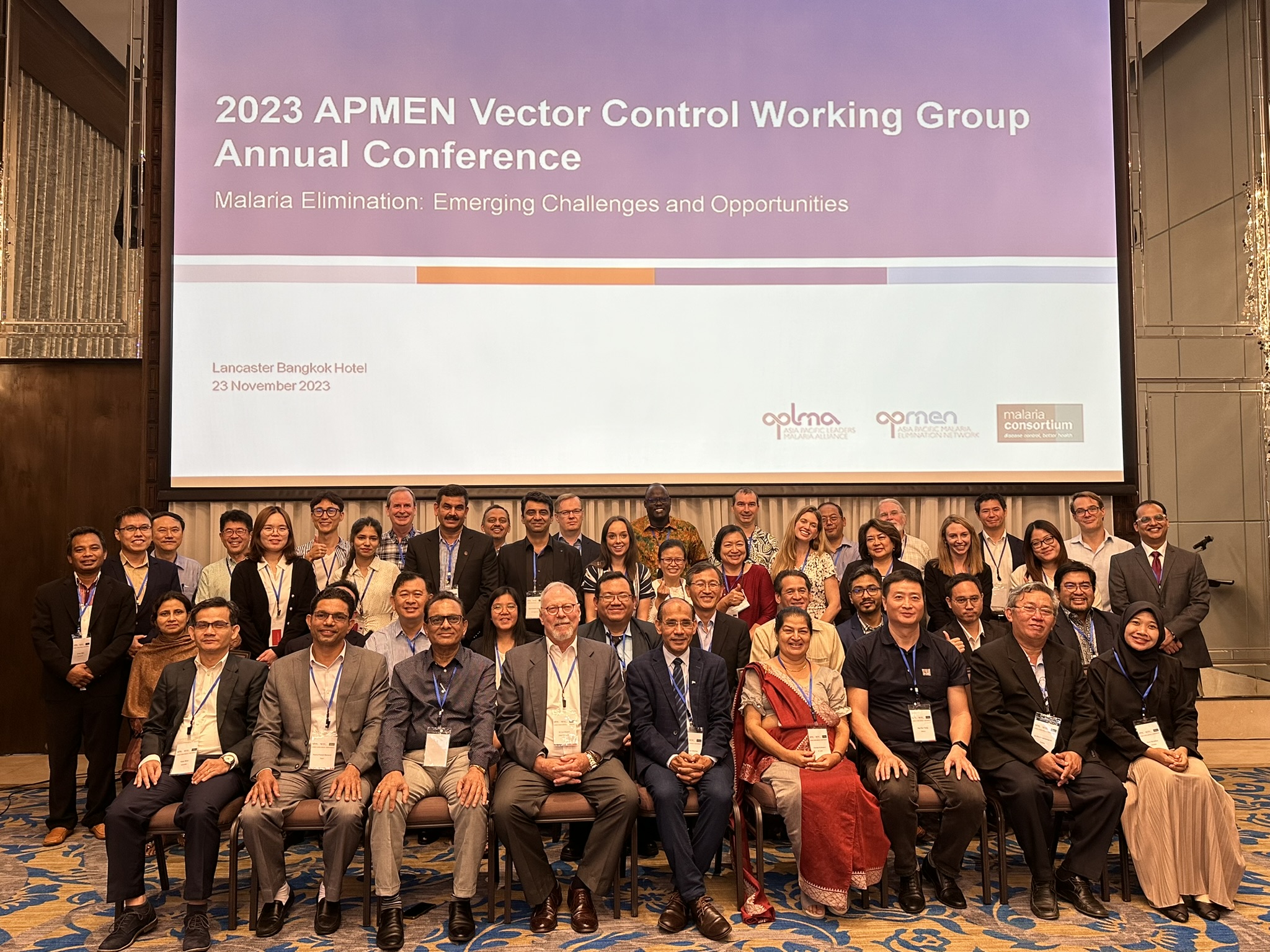
The APMEN Vector Control Working Group (VCWG) has successfully hosted its hybrid annual conference, centred on the theme "Malaria Elimination: Emerging Challenges and Opportunities." This gathering brought together our community of vector control practitioners across the Asia Pacific region, supporting discussions on shared concerns. We witnessed active participation from national malaria programme Directors and Managers from 19 APMEN member states, underscoring the enduring commitment to the goal of malaria elimination.
"APMEN Working Groups are dedicated to offering highest technical assistance and support to national programmes in their pursuit of regional malaria elimination. Despite challenges like insecticide resistance, climate change, and limitations in vector control and entomological surveillance capacity, I am confident that our productive discussions will address challenges, leverage our strengths, and explore opportunities to ultimately make this region malaria-free." – Dr Muhammad Mukhtar, Director, Directorate of Malaria Control, Pakistan
“APLMA and APMEN developed a technical advocacy model using APMEN's expertise to influence policy at senior political levels. It's crucial to now build skills for advocacy at national and subnational levels, focusing on domestic advocacy for research, resource mobilization, and testing new technologies.” – Amita Chebbi, Executive Vice President, Advocacy and Programs, APLMA
Key Sessions:
The 2023 VCWG annual conference featured three sessions covering ‘new tools and approaches against outdoor biting’, ‘capacity building in medical entomology’, and ‘bringing together global mosquito control forums’ to accelerate progress towards elimination.
The first session explored the innovative tools targeting outdoor-biting vectors which included several presentations on ‘human and cattle-administered ivermectin’, ‘spatial emanators and larval source management’, ‘Vectron T500’, ‘gene-drive for mosquito population control’, and ‘attractive targeted sugar baits for integrated vector management’. Traditional interventions often focus on indoor-biting mosquitoes, leaving a gap in addressing outdoor transmission. The development and deployment of new tools addressing outdoor-biting vectors in Asia Pacific are critical for comprehensive malaria control and aligning with regional elimination objectives. Through the Slido poll, participants recommended that outdoor spraying, Attractive Targeted Sugar Bait, and spatial repellent are the most feasible options for a small-scale trial.
Climate change's influence on disease vectors complicates vector control. Collaboration among national programmes, disaster departments, relief organizations, technical partners, and supply chain agencies becomes vital in addressing vector control challenges during climate-induced humanitarian emergencies. Dr Mukhtar from Pakistan highlighted on their efforts in managing vector control during the recent floods, offering valuable insights for partner countries to learn from.
Recognizing the declining number of medical entomologists globally and regionally, Session Two emphasized the urgency of training. These gaps considerably hinder national malaria programmes' capacity to achieve optimal reductions in local malaria cases and fulfil their elimination goals. Sharing experiences from ArcTech/WHO TDR training and entomology training in Malaysia and Thailand, experts identified priority needs for entomological training: a shortage of field-level entomology support staff with a subsequent lack of basic degree-level graduates. In addressing these basic skills gaps, participants discussed the need for enhanced vector surveillance skills, a broader understanding of public health entomology, and improved vector control skills.
The Session Three brought together global mosquito control forums, sharing the vector control strategies of Pan African Mosquito Control Association (PAMCA) and Alliance for Malaria Prevention (AMP). In addition, the speakers shed light on emerging threats like zoonotic malaria transmission (P. knowlesi) and urban malaria (An. stephensi). Moreover, details about the innovative 'Caserotek' artificial blood feeding device for mosquitoes, dual active ingredient insecticide-treated nets, and needs assessments were presented.
Country updates from Papua New Guinea, Indonesia, Pakistan, and Myanmar highlighted the malaria situation, challenges, and innovative strategies which emphasized the importance of sharing country-specific approaches for collective progress. It is great to share country-specific malaria and vector control strategies to strengthen collaboration, optimize resources, and collectively work towards a malaria-free region with APMEN’s peer-to-peer collaborative approach.
The participants at the annual conference recommended that the VCWG create sub-groups, specifically an Innovative Tool Subgroup, an Intervention Efficacy Subgroup, and a Climate Change/ Displaced Population Subgroup.
Key Takeaways:
Prioritize Innovative Tools for Outdoor-Biting Mosquitoes:
Acknowledging the challenge posed by outdoor-biting malaria-transmitting mosquitoes, it is crucial to prioritize the development and implementation of innovative tools and strategies tailored for outdoor environments. This initiative is essential for advancing efforts towards a malaria-free region.
Strengthening Capacity-Building Initiatives in Entomology:
APMEN's strategy emphasizes capacity strengthening initiatives by identifying the gaps and hosting trainings for national malaria programmes. By focusing on the study of mosquitoes and their behaviours, entomologists contribute valuable insights that inform targeted interventions. Investing in training is imperative for effective programme implementation.
Promoting Collaborative Approaches for Vector Control:
Encouraging collaboration among vector control platforms, national malaria programmes, and stakeholders is important. By merging expertise, resources, and strategies, a unified approach can be formulated to combat diverse malaria vectors. This collaborative effort enhances the impact of interventions and accelerates progress towards the common goal of eliminating malaria transmission.

"For APLMA, we are nowhere in advocacy without knowing what to advocate for, underscoring the importance of supporting APMEN’s work. APLMA’s role is to enhance visibility, raise awareness and maintain a political presence. We aspire to secure the required technical and financial resources to eliminate malaria from our region. APMEN’s collective dedication is indispensable, and we express gratitude for your commitment to this cause. We pledge to match the significance of your work and meet the advocacy challenges that lie ahead." – Dr Sarthak Das, Chief Executive Officer, APLMA
Special gratitude to Dr Muhammad Mukhtar and Prof Leo Braack for their dedicated leadership and invaluable technical expertise as the chairs of the APMEN Vector Control Working Group. Heartfelt thanks to the National Malaria Programmes for their strong collaboration and commitments, and deep appreciation to the experts and partners whose seamless support plays a pivotal role in our collective journey toward malaria elimination. Their commitment and efforts are crucial in advancing our shared goals to eliminate malaria from Asia Pacific region by 2030.
The recordings of annual conference have uploaded in Orene website.
